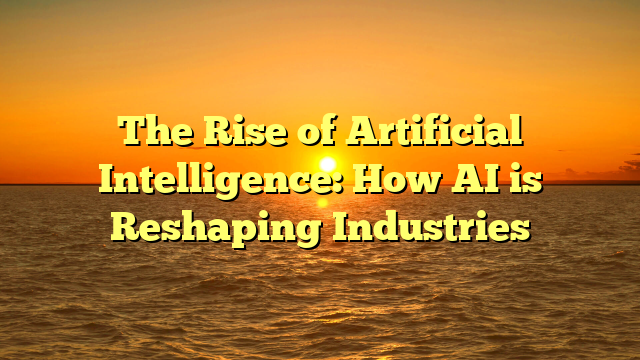
Artificial Intelligence (AI) has rapidly evolved over the past decade, transforming multiple industries and redefining the way businesses operate. From automation in manufacturing to advanced AI-driven healthcare diagnostics, the technology is revolutionizing nearly every sector. In this article, we will explore how AI is impacting various industries, its potential benefits, and the concerns surrounding its development.
1. AI in Healthcare: Revolutionizing Medical Diagnosis
AI has made a significant impact on the healthcare industry by improving medical diagnoses, treatment plans, and patient care. Machine learning algorithms can analyze vast amounts of patient data to detect diseases earlier than traditional methods.
AI-Powered Diagnostics: Tools like IBM Watson Health and Google’s DeepMind assist doctors in diagnosing conditions such as cancer, heart disease, and neurological disorders.
Personalized Medicine: AI helps create customized treatment plans by analyzing patient history, genetic data, and other medical records.
Robotic Surgery: AI-driven robotic systems, such as the Da Vinci surgical system, assist surgeons in performing precise operations, reducing risks and improving outcomes.
2. AI in Finance: Automating Trading and Fraud Detection
The financial sector has embraced AI to enhance security, automate trading, and improve customer experiences.
Algorithmic Trading: AI-powered trading bots analyze market data in real-time, making trades faster and more efficiently than human traders.
Fraud Prevention: AI detects unusual transaction patterns to prevent credit card fraud and cybercrime.
Chatbots and Customer Service: AI-driven chatbots assist customers with banking queries, reducing wait times and improving service quality.
3. AI in Transportation: The Future of Autonomous Vehicles
The automotive industry has invested heavily in AI for self-driving technology. Companies like Tesla, Waymo, and Uber are leading the way in developing autonomous vehicles.
Self-Driving Cars: AI-powered systems analyze road conditions, detect obstacles, and make driving decisions in real time.
Traffic Management: AI algorithms optimize traffic flow and reduce congestion in smart cities.
Predictive Maintenance: AI helps in vehicle maintenance by analyzing sensor data to detect mechanical issues before they cause breakdowns.
4. slot deposit 25 bonus 25 in Manufacturing: Enhancing Efficiency and Productivity
Manufacturing has greatly benefited from AI-driven automation, reducing human error and increasing efficiency.
Smart Factories: AI-powered robots and automated systems streamline production lines.
Quality Control: AI analyzes products for defects in real-time, improving product consistency and reducing waste.
Supply Chain Optimization: AI predicts demand, manages inventory, and optimizes logistics, reducing costs for businesses.
5. The Ethical Concerns of AI Development
While AI offers numerous benefits, it also raises ethical concerns, including:
Job Displacement: Automation powered by AI threatens jobs in multiple industries, requiring workers to upskill or transition to new careers.
Bias in AI Algorithms: AI models can inherit biases present in training data, leading to discrimination in hiring, loan approvals, and law enforcement.
Data Privacy: AI relies on massive amounts of data, raising concerns about how companies collect, store, and use personal information.
Conclusion
AI is rapidly transforming industries, offering innovative solutions to complex problems. From healthcare to finance, transportation, and manufacturing, AI has the potential to enhance efficiency and improve lives. However, ethical considerations and regulations must be addressed to ensure responsible AI development. As technology advances, society must find a balance between embracing AI’s benefits and mitigating its risks.




